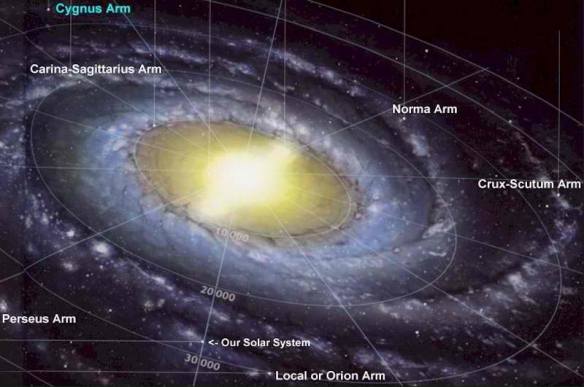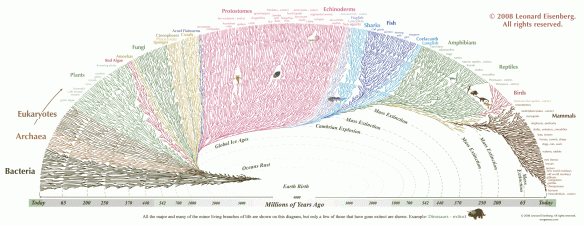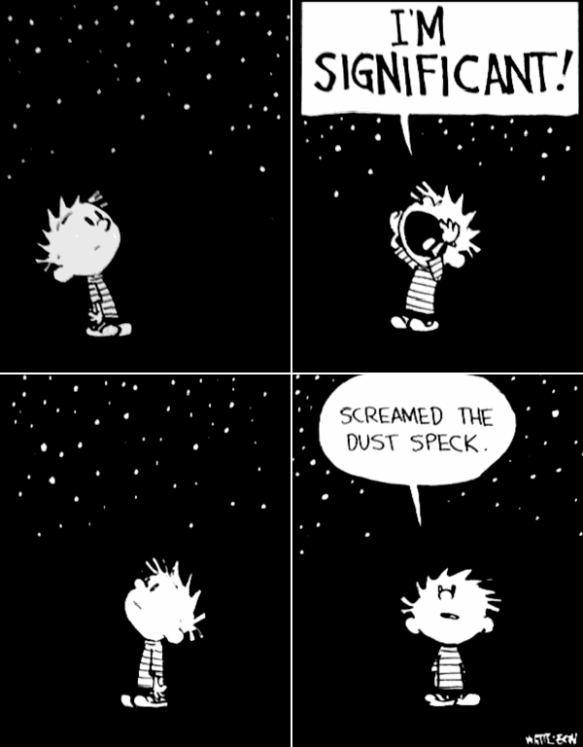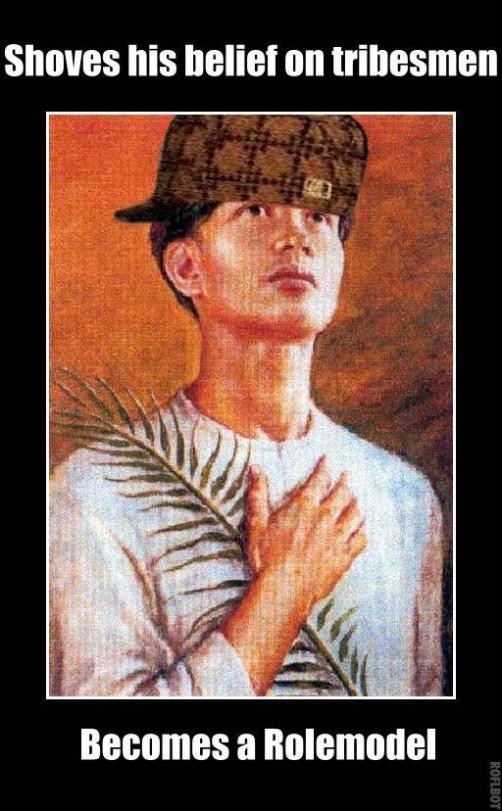Humility. If there is one thing most religions have in common, it is the idea that people should be humble before some form of deity. And that if a person does not bow down or even just acknowledge the existence of such deities, he or she would be perceived as incredibly arrogant. Being humble is what the religious love to brag about. A common remark against atheists is that they have become too smart to believe in gods. It is as if using one’s mental faculties (as in science) is of lesser importance than just blindly accepting certain ideas (as in religion). But is the devout to dogma really humble compared to the sceptic who espouses science? Let us find out.
It is the month of February. There are neither religious nor secular holidays to speak of for this month. (No, Valentine’s Day is not a real holiday. You do not get a day off and you certainly do not get double pay). Except perhaps that the two people, whose ideas are truly humbling, happen to be born in February. They are, of course, Galileo Galilei, born on the 15th in 1564, and Charles Robert Darwin, born on the 12th in 1809.
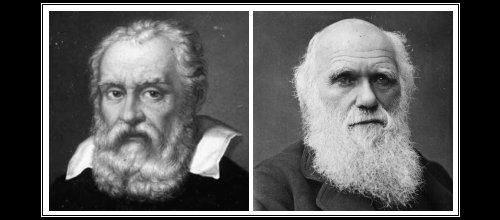
Gandalf and Dumbledore? Not really, it’s the February Guys: Galileo and Darwin. Contrary to popular knowledge, these two were not scientists. They were WIZARDS. Just look at those bad-ass beards.
Let us start with Galileo as he was born earlier. Galileo was an Italian astronomer and physicist. Although the telescope has been invented for some time, he designed his own telescopes and used them to observe the sky. Now, his “humbling idea” was not entirely his. It was developed earlier by the Polish astronomer Nicolaus Copernicus. Indeed, what he actually did was collecting and analyzing data he gathered from his observations with the telescope. Copernicus originally proposed heliocentrism, the idea that the Earth revolves around the Sun along with the other planets as opposed to Ptolemy’s geocentrism, in which the Earth was the center of the Universe with the Sun, planets, and other celestial bodies moving around it. However, nobody liked Copernicus’ system and thus, his writings were suppressed by the Roman Catholic Church.
But Galileo did his own research and found out that everything he had observed with the telescope conformed to the Copernican model and placed the Ptolemaic model in obsolescence. He published his findings in “A Dialogue on the Two Principal Systems of the World.” What Copernicus hypothesized, Galileo confirmed with empirical observations. For Galileo, who was also a professor of mathematics, the Ptolemaic system does not compute. However, for the dominant authority at the time, the Roman Catholic Church, the very idea of a non-geocentric Universe was offensive to its religious feelings. Under the Ptolemaic system adopted by the Church, the Earth was the center of the Universe thereby making the planet, and most especially its human residents, the center of attention for its creator, the god of the Bible. But Galileo’s discoveries put that idea into question. If the Earth was never the center of the Universe, what more of the humans living on it?
Now, you might ask, what is so humbling about Galileo’s idea? First, that the Earth has been reduced to just another object orbiting a much larger object. This planet is not in any special position in space. The very ground we stand upon is but one of many worlds that exists across the vastness of the Universe. The only difference is we are on this particular world and not on another. Second, our planet is truly insignificant on the astronomical scale. In Galileo’s time, the picture of the Universe is that of the Sun at the center with the Earth and other planets going around it. If that was not humbling enough, we now know that even the Sun is just a small star among the billions of other stars in the Milky Way galaxy. And there are billions of other galaxies. To make things even worse, scientists today have observations suggesting that everything we can see in the Universe, all the planets, stars, and galaxies, are less than ten percent of what the Universe contains. The rest of the Universe, it seems, is stuff we cannot directly observe. This is the part where science is the opposite of arrogance, as it does not claim truths about what is not yet known.
So, the Earth is no longer at the center of the Universe. But what about humans? If the Universe does not revolve around Earth, can the humans at least claim to be at the center of the living world?
This brings us to Charles Darwin, born some two hundred forty years after Galileo. Darwin was an English naturalist who proposed the idea of evolution by natural selection. Like Galileo before him, Darwin’s “humbling idea” was also not entirely his. Several other naturalists, including his grandfather Erasmus Darwin, had also suggested the idea that all living things had come about by evolution. The only difference was Darwin, like Galileo, painstakingly collected numerous and consistent evidence supporting his idea.
Now, Alfred Russel Wallace also came up with the very same idea of evolution by natural selection as Darwin. And the two in fact had been in correspondence with each other. Darwin already had his manuscript for his ideas ready way before Wallace came up with his but he had deferred having it published fearful of the potential uproar it would bring. Even when he had known of Wallace’s idea, being the gentleman Darwin was, he decided to submit his paper together with Wallace before the Royal Society so both of them would get credit. Of course, though both deserved credit, it was Darwin’s name that was attached to evolution by natural selection, giving us the term Darwinism.
So, what is Darwinism and what is so humbling about it? The modern theory of evolution is the scientific explanation that “life on Earth evolved gradually beginning with one primitive species – perhaps a self-replicating molecule – that lived more than 3.5 billion years ago that then branched out over time, throwing off many new and diverse species, and the mechanism for most, but not all, of evolutionary change is natural selection” (Coyne 2009).
Before Darwin, there has never been a rational explanation based on observations for the apparent design of all living things. Many theories of evolution had been proposed but none had the simplicity and overwhelming amount of evidence that Darwinism had. Of course, there are religion-based creation myths that tried to explain how life came to be but all of them are in conflict with each other and not supported by any evidence.
So where is the part where we are supposed to be humbled? Most, if not all, creation stories tell versions of a narrative about gods, giants, dragons, and other monsters playing a part in creating the world and the creatures that inhabit it. And since human beings are telling these stories, they are, often than not, central to these myths thereby making themselves special above all other living things.
These are in contrast with Darwinism in which humans are just another species of organisms that arose from earlier and more primitive life-forms. Human beings evolved just like every creature that ever existed. We were neither created from molded clay, spitted out from the belly of a giant, nor came out of a bamboo that split in two. All these stories are simply that, stories. They have no basis in fact. They were simply the products of people who had insufficient data for meaningful answers to nagging questions of their existence. And, whether intentional or not, these stories have human conceit in them.
Christianity in particular has a history of opposing purely naturalistic evolution because it removes man’s special place in the world. As with the Roman Catholic Church’s objection to heliocentrism during Galileo’s time, opposition to Darwin has largely been from organized religion. The religious establishment could not accept that humans are closely related to chimpanzees, more distantly related to monkeys, even more distantly related to birds, reptiles, and fishes. The very thought was degrading as it diminishes humans to just mere beasts.
Now we can clearly see how this view contradicts most creation myths wherein humans are the main characters with the other beasts as mere supporting cast. In Darwinism, each kind of organism is a star of its own right. Every living thing that exist today are all pinnacles of survival. No single creature can claim to be the best among all others because each one is best suited in their respective environment. Indeed, if we are to crown a type of organism as the king of the beasts for dominating the most number of ecosystems, we would give it to the lowly insects as their kind has conquered nearly every niche in every biome they have been exposed to.
People might differ and maintain that we humans are special because only we have unique traits such as self-awareness, symbolic language, and intelligence. But even these traits are not restricted to humans only. Recent research studies have found out that other creatures have, to a lesser extent, some form of awareness, language, and intelligence. They just do not exhibit them as much as we humans do because of genetic differences in their biological makeup.
Where does this leave us now? Since humans are simply the result of millions of years of evolution, just like all other species, what significance do we have left?
Some religions, like the Roman Catholic Church and the Anglican Church, have already accepted the fact of evolution by natural selection. But they still assert that humans occupy the biological pedestal, claiming that humans have souls created by their god. Of course, this begs the question: where in the evolutionary tree did this god insert the human soul?
Another contentious issue with a deity guiding the process of evolution is that the whole thing is incredibly wasteful. Just think of it as manufacturing a thousand cars and then rejecting nine hundred and ninety-eight of them, leaving only two to make it out of the factory. No intelligent designer would do that. Surely a human engineer could do better. The way it actually plays out in nature is that most offspring never survive into reproductive stage. Only the fittest few ever make it. Either they are eaten by predators, outrun by competition, fatally infected with pathogenic microbes and parasites, or simply victims of natural calamities.
There are no perfect individuals and no perfect species. The best or fittest individual is only slightly better in any given trait than worst one in any given population. But these differences in fitness all add up under varying circumstances. If there is a deity designing all of this, then it deliberately designed most of these individuals to fail. Why such a cruel fate?
However, if we understand evolution as Darwin did, we would see that nature is neither caring nor cruel but simply apathetic to the plight of creatures big and small. If a god had any hand in this, it is not the god of any organized religion but an impersonal god unconcerned with the goings-on in the living world. Darwin was particularly aghast at the idea of a benevolent creator which designed a wasp’s parasitic larvae which hatched under a caterpillar’s skin and devouring it from the inside, slowly killing its host as it developed into an adult wasp thereby repeating the same macabre method.
For most of human history, we were like that poor caterpillar, suffering from the various parasites and microbes we could not see, and barely surviving from natural disasters we could not yet explain. Yet the religious argue that the whole world was designed with us in mind. Is this not arrogance? Is this not human conceit? Putting ourselves on a pedestal at the center of all things and then claim humility before some god?
Now, while both Galileo’s heliocentrism and Darwin’s evolution do not specifically claim to deny the existence of religion’s gods, they certainly call into question man’s true place in the Universe. Even if a god exists, it most likely would not be so parochial and anthropocentric to focus all its attention on a single species of bipedal apes on a small planet revolving around an average star in just one of billions of galaxies.
Suppose an anthropomorphic god with infinite wisdom does exist, would it be so insecure as to restrict what humans would think? Even Galileo once said, “I do not feel obliged to believe that the same God who has endowed us with senses, reason, and intellect has intended us to forgo their use and by some other means to give us knowledge which we can attain by them.”
Let us go back to question in the first paragraph: is the devout to dogma really humble compared to the sceptic who espouses science? Clearly, this is not the case. We now know from Galileo and Darwin the undoubtedly humbling facts that we humans are neither at the center of the Universe nor at the top of the living world. Rejecting this reality is not only arrogant but intellectually dishonest. The faithful pretends that he has knowledge of the world as he imagines it to be as revealed from some divine source. This is in contrast with the unbeliever who only has her mental faculties to try and understand the world as it really is. And finally, the atheist does not bow down to gods not because she is full of herself, but because she realizes no human should be ever a slave to the whims and caprices of imagined petty cosmic dictators.
So, what consolation do we still have if we are insignificant like mere dots on a cosmic canvass? Knowing that the Universe is indifferent, we should treat one another more kindly as we are significant only to each other, because “in our obscurity – in all this vastness – there is no hint that help will come from elsewhere to save us from ourselves” (Sagan 1994).

